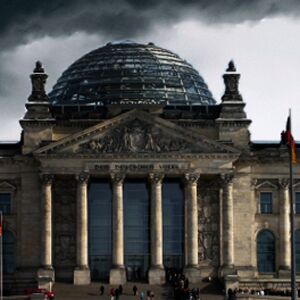
Germany Facing Tough Times
Three weeks ago, as I scanned the headlines in the newspapers at Frankfurt’s busy airport, the stock markets were caught in the grip of the galloping fear that is the dread of every investor. The markets had tanked.
A few days ago, as I transited through Frankfurt returning from the Middle East, it was apparent from scanning German news commentary that the seriousness of the effect of the global economic crisis on the German and, in the wider sense, the European Union economy is beginning to dawn on the German people.
Having faced recession only a few years ago, Angela Merkel’s government has presided over an aggressive export-led recovery leading the German economy into what appeared to be a rosy future of market expansion up to a year ago. However, warnings of tough times ahead are now being sounded from Berlin as the global recession begins to bite all across Europe.
“Germany’s export sector will suffer particularly under the international financial crisis, and the country is unlikely to emerge from its economic doldrums anytime soon, the Finance Ministry said” (Deutsche Welle, October 23).
According to a monthly report from Germany’s Ministry of Finance, the country’s “crucial export sector is likely to hobble the economy at some point. … The report said the ‘weakness of the global economy has weighed on exports’ that contribute significantly to the economy, given that Germany is the world’s leading exporter” (ibid.).
The Bild newspaper reported that Volkswagen Chairman Ferdinand Piëch expects the German car industry to face a prolonged downturn, declaring that the problems of the capital market are continuing to damage the already weak German economy (October 23).
Piëch’s gloomy outlook follows a slew of cutbacks in the German automotive industry. Last week, Deutsche Welle reported that “German luxury carmakers Daimler and bmw said over the weekend they would temporarily close factories as a result of slumping sales. General Motors’ German arm, Opel, has also announced output cuts, as have Volkswagen’s Spanish subsidiary Seat and Czech subsidiary Skoda” (October 26).
Germany’s senior citizens are making connections with similar events embedded in their history of the last century. In last Monday’s edition of the New York Times, a page-1 report headlined “Some Europeans Prepare for the Worst” cites the fact that “Germany, where many people lost their savings twice in the 20th century, is one of the richest laboratories of European historical scars, welds that help explain the country’s fears of inflation.”
The Times quotes Tony Pierenkemper, a professor of economics at Cologne University, as insightfully declaring that “History matters. In times of crisis you really get to know a country and its people. Traumatic events are seared into the collective consciousness and often survive into the next generations.”
A significant problem arises when that which is seared into the collective consciousness of a particular element within society sees demagoguery as the solution to the chaos and confusion of economic, social and political turmoil, as is the case with that element within German society that unfortunately is still moved by a persistent Nazi spirit.
The Trumpet has been strident in publicizing a warning to the world that the Nazi spirit that arose amid conditions such as we see ripening in Europe today, never died. As Herbert Armstrong declared, it survived to continue its work underground, biding its time for one last-ditch resurrection!
History does matter!
Certainly, as Professor Pierenkemper declared, “In times of crisis you really get to know a country and its people.” To no people more than the German folk does this particularly apply, especially given their nature to seek to impose order by military methods over prevailing chaos.
The German mind hates disorder.
The rising crisis in Europe is creating a fertile environment for the revival of the Nazi spirit.
Watch Europe!
Watch Germany!
And watch for the rise of a demagogue who is right now, no doubt, biding his time, behind the scenes, awaiting his moment to be thrown into the limelight by “flatteries” (Daniel 11:21), captivating the minds of a multitude of followers and their leaders, intent on imposing a very Germanic solution on the emerging chaos that is even right now rippling across the European continent and indeed the whole world.
Read our booklet Germany and the Holy Roman Empire. It will give you a very real historical and prophetic vision with which to follow unfolding events within Germany, Europe and indeed across the whole globe. The situation of increasing chaos and confusion rapidly spreading around the world needs a clear explanation. Our booklet gives both the historical and prophetic scope within which to make sense out of this great repetition of history that is unfolding before your eyes today.
It is, in reality, the most powerful demonstration of the fulfillment of Bible prophecy for our times!
The ancient Holy Roman Empire is back, calling the tune in the effort for a grand “new” economic system that will soon hold the whole world to ransom! (Revelation 13:16-17).
